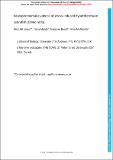Files in this item
No experimental evidence of stress-induced hyperthermia in zebrafish (Danio rerio)
Item metadata
| dc.contributor.author | Jones, Nick A. R. | |
| dc.contributor.author | Mendo, Tania | |
| dc.contributor.author | Broell, Franziska | |
| dc.contributor.author | Webster, Mike M. | |
| dc.date.accessioned | 2019-12-17T00:36:38Z | |
| dc.date.available | 2019-12-17T00:36:38Z | |
| dc.date.issued | 2019-01-24 | |
| dc.identifier | 257381203 | |
| dc.identifier | 59dafab0-691b-4e48-be36-afd520d2701d | |
| dc.identifier | 85060526884 | |
| dc.identifier | 000457426400020 | |
| dc.identifier.citation | Jones , N A R , Mendo , T , Broell , F & Webster , M M 2019 , ' No experimental evidence of stress-induced hyperthermia in zebrafish ( Danio rerio ) ' , Journal of Experimental Biology , vol. 222 , no. 2 , jeb.192971 . https://doi.org/10.1242/jeb.192971 | en |
| dc.identifier.issn | 0022-0949 | |
| dc.identifier.other | RIS: urn:E6F4EEC0AE9EF2357B54C4E1D09BD58B | |
| dc.identifier.other | ORCID: /0000-0001-9597-6871/work/60427800 | |
| dc.identifier.other | ORCID: /0000-0002-6031-7507/work/60631013 | |
| dc.identifier.other | ORCID: /0000-0003-4397-2064/work/148888390 | |
| dc.identifier.uri | https://hdl.handle.net/10023/19145 | |
| dc.description | NJ was supported by a studentship from The Fisheries Society of The British Isles. | en |
| dc.description.abstract | Stress-induced hyperthermia (SIH) is characterised by a rise in body temperature in response to a stressor. In endotherms SIH is mediated by the autonomic nervous system, whereas ectotherms must raise their body temperature via behavioural means by moving to warmer areas within their environment (behavioural thermoregulation). A recent study suggested that zebrafish (Danio rerio), an important model species, may move to warmer water in response to handling and confinement and thus exhibit SIH, which, if accepted, may have important practical and welfare implications. However an alternative hypothesis proposed that the observed movements may been produced by avoidance behaviour rather than behavioural thermoregulation. Investigating the claims for SIH in zebrafish further we conducted two experiments that extend the earlier study. The first experiment incorporated new conditions that considered fish behaviour in the absence of thermal variation, i.e. their null distribution, an important condition that was not performed in the original study. The second was a refined version of the experiment to reduce the numbers of fish and aid movement between areas for the fish. In contrast to the previous study, we saw no effect of handling or confinement on preference for warmer areas, and no evidence for SIH in either experiment. Instead we observed a short-lived reduction in preference for warmer areas immediately post stress. Our work suggests that zebrafish may not experience SIH and claims regarding fish consciousness based on SIH may need to be revised. | |
| dc.format.extent | 8 | |
| dc.format.extent | 1173556 | |
| dc.language.iso | eng | |
| dc.relation.ispartof | Journal of Experimental Biology | en |
| dc.subject | Thermal preference | en |
| dc.subject | Fish welfare | en |
| dc.subject | Emotional fever | en |
| dc.subject | Fish stress | en |
| dc.subject | Behavioural thermoregulation | en |
| dc.subject | Ectotherm thermoregulation | en |
| dc.subject | QH301 Biology | en |
| dc.subject | NDAS | en |
| dc.subject.lcc | QH301 | en |
| dc.title | No experimental evidence of stress-induced hyperthermia in zebrafish (Danio rerio) | en |
| dc.type | Journal article | en |
| dc.contributor.institution | University of St Andrews. School of Biology | en |
| dc.contributor.institution | University of St Andrews. Scottish Oceans Institute | en |
| dc.contributor.institution | University of St Andrews. Centre for Biological Diversity | en |
| dc.contributor.institution | University of St Andrews. Centre for Social Learning & Cognitive Evolution | en |
| dc.contributor.institution | University of St Andrews. Coastal Resources Management Group | en |
| dc.identifier.doi | https://doi.org/10.1242/jeb.192971 | |
| dc.description.status | Peer reviewed | en |
| dc.date.embargoedUntil | 2019-12-17 |
This item appears in the following Collection(s)
Items in the St Andrews Research Repository are protected by copyright, with all rights reserved, unless otherwise indicated.

